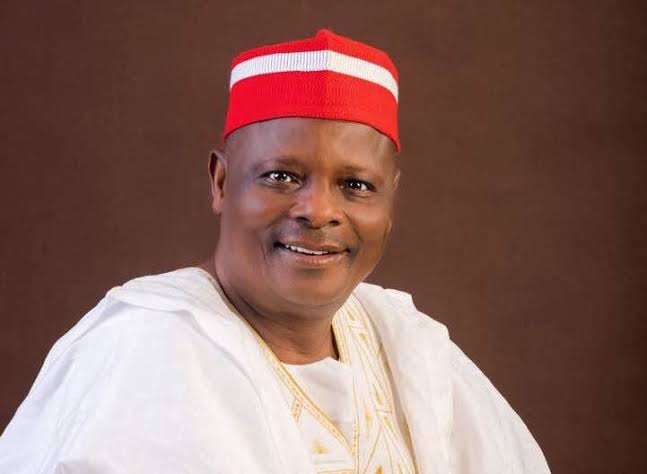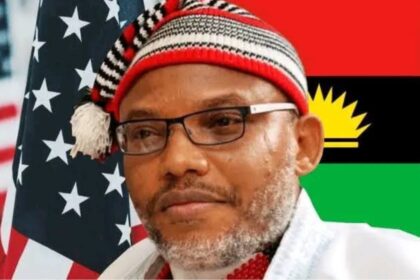The days ahead will be interesting in Nigeria. While the ruling All Progressives Congress (APC) appears to be banking on Rabiu Musa Kwankwaso to have an easy ride to victory in 2027, the reconciliation that took place in Aso Rock Villa, Abuja, between the warring factions in Rivers’ leadership may not have been well received. The days ahead are pregnant.
Many Nigerians may not have known the reason behind the move by the highest echelon of the ruling All Progressives Congress (APC) to have Rabiu Musa Kwankwaso join their fold.
Kwankwaso is from Kano State in the northwestern geopolitical zone of the country. The state has 44 local government areas, with an estimated population of 16,253,549 (sixteen million, two hundred and fifty-three thousand, five hundred and forty-nine) people.
Its huge number of LGAs makes some states such as Bayelsa (eight), Gombe (11), Ebonyi (13), Nasarawa (13), Niger (15), Abia (17) and others green with envy.
Beyond the cult following he enjoys in Kano with his established Kwankwasiyya Movement, Kwankwaso is seen as having a huge electoral capital for any party that gets his support.
Despite the fact that the New Nigeria Peoples Party (NNPP) was embroiled in a leadership crisis before the 2023 general election, the party managed to win in Kano. It is the only state being governed by the NNPP in the present dispensation. That feat was achieved through the astuteness of Kwankwaso.
In the 2023 presidential election, results declared by the Independent National Electoral Commission (INEC) in Kano showed that the APC got 513,846 (31.50 percent); the Labour Party got 30,089 (1.84 percent); the NNPP got 953,179 (58.42 percent); the People’s Democratic Party got 118.44 (7.26 percent); and others got 15,900 (0.97 percent).
 The president and his astrologers must have sat down to do the mathematics and must have come to the conclusion that Kwankwaso being on their side in 2027 would do the party a world of good.
The president and his astrologers must have sat down to do the mathematics and must have come to the conclusion that Kwankwaso being on their side in 2027 would do the party a world of good.
If, for instance, Kwankwaso had been in the APC in 2023, the NNPP votes of 953,179 would have added to that of the APC – 513,846. The APC could have easily secured 1,467,025 (one million, four hundred and sixty-seven thousand, and twenty-five votes).
The political Nostradamuses in the APC may have also advised the President that he would be doing himself much harm if he allows Kwankwaso to successfully go into an alliance with the PDP that got 118,445 votes in 2023, added to the growing discontent against the APC in parts of the North.
When compared with the political relevance of Borno State to the APC, observers believe that Kano towers above the northeastern state. The 2023 presidential result strengthens the argument.
Whereas APC got 43,930 votes in Borno, PDP got 30,877 votes, and NNPP got 1,194, Borno has only 27 LGAs, 13 councils short of Kano’s.
Although the APC won in Borno, the political calculation at the moment ahead of 2027 may have changed so that the APC cannot be resting on its oars, hence the move to begin to look for the black sheep before nightfall.
The Vice President, Kashim Shettima, may have done well to deliver his state in 2023; he has also eaten and is still eating the fruit of his labour, but it would seem that some party apparatchiks strongly believe that the broom association must look elsewhere if it hopes to retain power in 2027 with the growing discontent in the North.
In the politics that are playing out in the APC, the sudden resignation of Abdullahi Umar Ganduje as the party’s national chairman has been said to have been masterminded by the president’s decision to have Kwankwaso, who reportedly made some demands on the APC as conditions to crossover to the broom association.
It is being rumoured that Ganduje has been slated to be offloaded out of the country in the name of an ambassadorial posting. If this works as being touted, it would mean that Ganduje would be irrelevant in 2027, having nothing to do with the affairs of the party or the running of the country from his political wilderness.
Ganduje, who has been a political foe of Kwankwaso, tendered his resignation on Friday, 27, 2025, citing ill health. The development left many Nigerians tongue-tied, as they never expected it.
The haste with which the resignation was done has been described by many as akin to the demand for the head of John the Baptist.
If you know Siminalayi Fubara well, if you have observed him closely, he walks with a special gait with his backside arched upwards. It may not be natural, but it was a walking pattern he developed when he was forming to be a “guy man” in his secondary school days.
His arched back is always exaggerated when he is provoked. And he has been provoked countless times since he mounted the saddle on May 29, 2023.
Make no mistake about it, the way he walks does not suggest weakness or weak spines, but his political travails in recent times seem to be exerting much pressure on him to threaten the spine.
He got infuriated several times at the heat of the impasse between him and his political godfather, Nyesom Wike, who is now the FCT minister.
On one occasion, he spoke angrily to the highest echelon of the Nigeria Police in Abuja. He strongly believed that in a democracy, as is practised in many climes, a state governor is immune from all manner of meddlesomeness and that it is not possible for the operators at the federal level to dictate what should happen at the subnational levels. But Nigeria is a different clime, and the brand of democracy being practised is quite different.
In March, 2025, President Bola Ahmed Tinubu imposed a state of emergency on Rivers State and violently shoved Fubara aside. The declaration was condemned by many Nigerians who felt that the president was not being impartial in the political standoff between the governor and Wike.

Since the development, Fubara has continued to receive solidarity from various quarters. But many seem to have withdrawn their sympathy on the allegation that he appeared very desperate to return to power even under stringent conditions that were designed to humiliate him, although those who hold such views have not made public the clear copy of the said agreement that Fubara allegedly signed on Friday, 27, 2025, inside Aso Rock Villa. What is not in doubt is that the content of the agreement may not have been largely in favour of the governor. This could be gleaned from his statement that no sacrifice is too much for the good of the people of Rivers.
It is being touted that part of the agreement is that the governor should not seek re-election after he served out his first term.
Observers are saying that what transpired at the “conciliatory” meeting may have been a choreography leading up to the grabbing of the state by the ruling party, the next step of which would be to stampede Fubara to port to the APC.
It would not be surprising to hear Fubara announce any time soon that he has moved to the ruling party. For many observers, Sim has been conquered and his political spine broken.
Expressing anger over the Abuja accord, Theophilus Alaye, president of the Ijaw Youth Council (IYC), took exception to the part of the agreement that allegedly demands that Fubara must not seek re-election.
Alaye believes that the governor’s constitutional rights had been infringed upon.
“What is happening in Rivers is about individual and primitive love for power. They have succeeded in holding the state to ransom,” he said.
He also flayed the Supreme Court for failure to rule on the case brought to it by the governors of the People’s Democratic Party (PDP).
“Why is it taking the Supreme Court an eternity to weigh in on the appeal by the PDP governors over the removal of Fubara? This does not bode well for democracy. The Supreme Court was supposed to rule on the case as a matter of emergency,” he said.
It is believed in many quarters that the so-called reconciliation has upheld the stranglehold of Wike on the state. For many observers, it is not resolution but shenanigans. The days ahead will tell.
-Culled: BusinessDay





Kwankwaso with his political skills, comes to put an end into river matters,